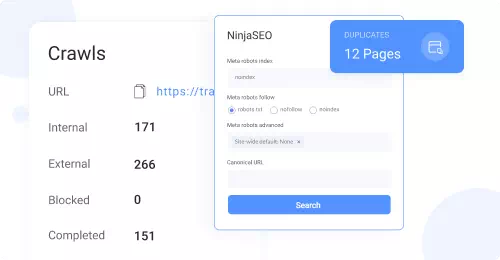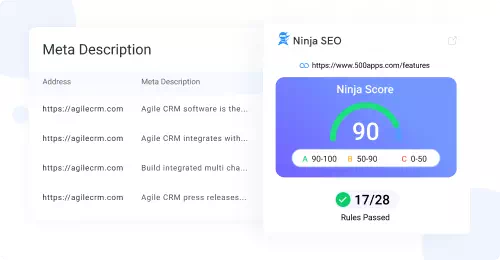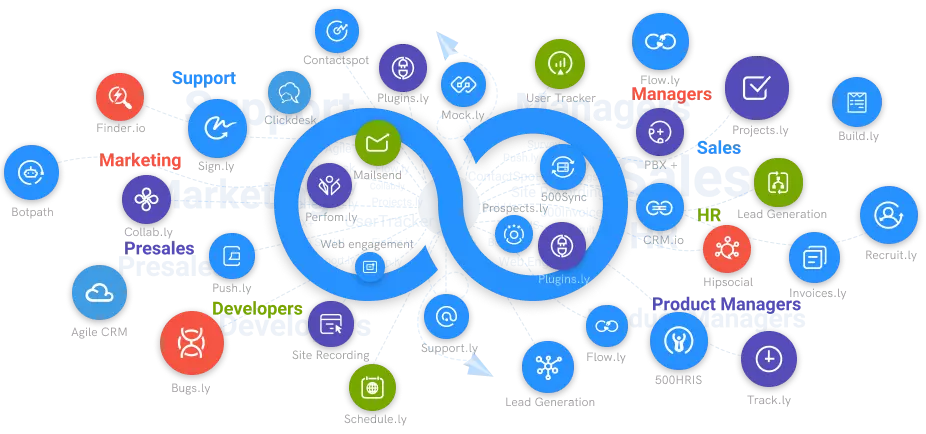What are the Factors to Consider for Improved SEO?
When it comes to SEO, there are a variety of factors to consider. These include keyword research and analysis, meta and header tags, external links, content length and quality, CSS navigation, age of domain name and more.
#1
Audit, optimize websites, build links and grade webpages
#2
Get a detailed report of backlinks from a frequently updated database of 3.2B inlinks
#3
Generate keywords and LSI based on Google keywords search tool
#4
Generate the site crawl map to get the hierarchical structure of all the web pages and links
#5
Crawl webpages, find score & get recommendations using powerful extension
#6
Identify authors details based on specific keywords & automate outreach activity using links bot
#7
Foster Link Building Proces
#8
Instant Sitemap Generation
#9
Unbelievable pricing - the lowest you will ever find
#10
Everything your business needs - 50 apps, 24/5 support and 99.95% uptime
It takes much longer for new content to settle and gain authority on a search engine results page (SERP) but you can update content and take advantage of comparative advantages. Not only will your updated content rank higher in the SERP and improve your number of visitors and leads, but it will also take much less time and resources to update existing content than create a brand new article. Update and reuse your most successful content to extend its lifespan so that you can get the best results over a longer period of time and that it is evergreen content.
Website Optimization
By optimizing your websites, including your blog posts, you make your website visible to people who enter in search engines such as Google's search engines related keywords associated with your products and services. Good formatting of your content helps improve the user experience on your website. Word count is not the norm in the SEO world, but if all your stuff is read and it is not useful, longer content will give you the chance to add more value by introducing more keywords and embedding outgoing links. People will of course spend more time reading and increasing dwell time.

Navigating a website is important to help visitors find the content they want. Google's search results are delivered at the page level, so Google likes to get a feel for the role that each page plays in the larger image of the site.
Keyword Optimization
To attract search engines to your content, you need to consider SEO factors. Page SEO is the process of optimizing individual pages on your site for a specific keyword. By optimizing your content for a specific keyword, search engines tell you where pages are and how they rank.
For example, do you not want the word ""engineering"" three or more times to be repeated in the URL or the phrase ""Northern Lights"" in the title and headings of the page. When creating the content of a page or writing an article, identify 4-5 keywords you want to address.
When you build a website for the benefit of your users, the optimization is designed to improve the user experience. You want Google to upgrade your site by allowing search engines to search your site. The following suggestions can improve search engine optimization (SEO) and watch your site rise to the top of the search engine results.
Content Quality
Quality content is the number one driving force in your search engine rankings, and there is no substitute for great content. High-quality content created for your intended users increases page traffic and improves the authority and relevance of your pages.

Video gives you a boost in the rankings by allowing more people to see your site. This means that more people click on your links but they don't stay on your site if your pages are not of high quality. This metric helps search engines identify which search results are most valuable to users, so optimizing your site content for search snippets can increase user engagement. This tells Google and other major search engines that your pages are high quality and that users stay longer on the page, not only the page on which they landed but also other relevant pages.
Page ranking factors have a big impact on the ability of your pages to rank and be optimized. Page ranking factors are where the authors (publishers) have a direct influence.
Consider Search Engine Algorithm
There are over 200 SEO ranking factors that help search engines to determine which pages appear in the search results and where they rank. If you want your site to be the top-ranked SERPs (Search Engine Results Pages) for your site, you must optimize your online presence to meet everyone's needs. Before we delve into the top SEO ranking factors, it is important to note that ranking factors are constantly changing.
Many of the SEO tips and tricks you hear revolve around fulfilling a handful of factors in how Google's search engine algorithm adapts websites. When researching SEO, you will come across countless articles about keywords. In these articles, keywords are what connects users to search for your content and lead to organic traffic.
Keep Online Visibility at Pace
Search engine optimization (SEO) is defined as a process that affects the visibility of a website or website in search engines via natural (unpaid) and organic search results. SEO involves identifying the keywords and phrases that your target audience uses to search for products and services and how your work ranks in the search. On this page, we explain what makes SEO important and some search engine optimization techniques (search engine optimization tools) that you can use to improve your online visibility.
Consider Using Meta Descriptions and Titles
Google will select the most relevant sections of your pages with visible text if they match the user's search query. Consultants are working on improving the site architecture in the hope that this will affect their ranking, but most experts agree that using SEO techniques is not enough to rank a site for your keywords high. If most of the above activities are carried out by SEO agencies or companies that check your website and provide you with the right content and keyword-friendly URLs, you will lose the best SEO techniques for your website.
Our own Global Report 2019 - SEMrush State of Content Marketing shows that search engine optimization is viewed as the most effective content marketing tactic in 2019. SEMrush Ranking Factors Study 2017: On-page optimization ranks ahead of user experience and on-site factors. For decades, Google has recognized that performance elements such as website speed are important to users and has added them to the ranking factors, and it can improve or break the performance of your pages in Google's search results.
It is important to note that there is not a single ranking factor that will make or break your SEO. Instead, it's a combination of your technical efforts on-page and off-page that work together to create an SEO-friendly site.





